- Home
- Lois Lowry
Anastasia at Your Service Page 7
Anastasia at Your Service Read online
Page 7
Maybe, in fact, she would go to nursing school, or even medical school, when she grew up. If only they wouldn't make her wear those white stockings. She really hated the white stockings that nurses wore.
But Anastasia's image of Sam the Invalid faded even before she saw him. She could hear him when they were still outside in the hall approaching his room. Not because he was whimpering feebly with pain. He was singing, in his loudest voice, "The monkey he got drunk, and sat on the elephant's trunk..."
He stopped singing when he saw his family. He grinned, waved, and said, "Hi! Did you bring me anything?"
The nurse who was in his room grinned also, and said, "Hi, there. You have quite a boy here. His repertoire of songs beats anything I ever heard at a fraternity party!"
Sam's mother went to the bed and kissed Sam's little face where it poked out beneath the turban of bandages. So did his father. Sam wiggled and made a face. He didn't like being kissed.
Anastasia thought about kissing him, but she just squeezed his feet through the covers, and said, "Hello, old Sam."
"It's okay to squeeze my feet," said Sam. "But don't squeeze my arm, because I have ivy on my arm."
Good grief, thought Anastasia. His brain has been damaged.
"You have what, Sam?" asked her mother.
"Ivy," said Sam. He pointed with one finger to the needle in the back of his other hand. A tube ran from the needle up to a bottle hanging on a metal stand.
"Oh." Mrs. Krupnik laughed. "An IV."
"That's what I said," said Sam with satisfaction.
"That's how they feed you, Sam, until you get a little better," his father explained.
"Yep. They feed me poison. It's my poison ivy machine."
Anastasia groaned. Sometimes Sam was impossible.
***
Later, back at home, the telephone rang.
"Anastasia? Willa Bellingham here. I've tried to reach you several times today."
"Well, I wasn't home, Mrs. Bellingham, because my little brother had a very serious acci——"
But Mrs. Bellingham interrupted her. "The rug cleaners have just left, and I am completely dissatisfied with the job they did. It is simply impossible to find conscientious workers these days."
"I try to be conscientious, Mrs. Bellingham," said Anastasia pointedly, and as politely as she could. But it was hard to be polite. She was furious. Mrs. Bellingham had interrupted her in the middle of telling about Sam's accident. Mrs. Bellingham was an insensitive creep. She didn't have the slightest interest in anyone else's problems. All she cared about was her stupid Oriental rugs.
Secretly, Anastasia hoped that someday a huge, un-housebroken dog would visit Mrs. Bellingham's house. Hah. So much for the Oriental rugs.
"Yes," said Mrs. Bellingham. "Of course you do. Now I would like you here tomorrow at ten, promptly. I'm giving a large party next week and there's a great deal to be done. I won't be home because I have my volunteer work to do. Mrs. Fox will give you your instructions."
Good grief, thought Anastasia. Probably the silver all needs to be polished again. She groaned silently, and calculated quickly in her head. She would have paid back her debt to Mrs. Bellingham in just seven more hours. Then she could quit.
But in a million years she didn't want to miss that party next week. She wanted to be there when Mrs. Bellingham was humiliated. She decided she wouldn't quit until after the party. School would be starting the week after that, anyway.
"All right, Mrs. Bellingham," she said.
"You'll be here promptly at ten?"
Anastasia sighed. "Atcher service," she said.
7
Rachel and Gloria were washing all the slipcovers in the house. There seemed to be about three million slipcovers. But Rachel and Gloria didn't seem to mind. They trudged back and forth to the washing machine and dryer and the ironing board, and they were quite cheerful. They called "Hi!" to Anastasia when she arrived. Anastasia had been a little worried that they might comment about her bosom, but they didn't seem to notice that it had disappeared.
Neither did Mrs. Fox, who was very busy making lists. She sat at the kitchen table, writing long lists of foods for the party, and she had ball-point pen marks on her lips, because she kept chewing on her ball-point pen.
Please don't ask me to polish silver, thought Anastasia. Please.
And it worked.
"Books," said Mrs. Fox, when Anastasia asked her what she should do. "In the library. Dust all the books." Then she nibbled at the ball-point pen again. Her lips were turning quite blue, like a creature in a horror movie. It was a rather interesting effect, and Anastasia thought briefly that maybe if she became a writer someday she would write a novel about a fat housekeeper who secretly became a werewolf at times, and maybe ate raw liver out of the refrigerator. Thinking about it made her stomach feel queasy.
But working in the library was fun. It was a medium-sized room that opened off the front hall, and all four walls were lined with bookcases. In the center there was a large mahogany desk. Probably Mrs. Bellingham sat at that desk and counted her money.
Probably she sat there and wrote her will.
Probably, thought Anastasia uncomfortably, she would disinherit her granddaughter if she knew what Daphne was up to.
There was a photograph of Daphne in the study, a color photograph of Daphne looking happy and windblown, wearing a blue sweater, somewhere with ocean in the background. It was in a silver frame.
The smiling Daphne in the photograph didn't look like the sort of person who would hate her own grandmother.
In fact, until she had met Daphne, Anastasia had never known anybody who had hated her own grandmother. There had been times when Anastasia had gotten mad at her grandmother, but that wasn't the same. She had always loved her. Now that her grandmother was dead, she had her grandmother's wedding ring, which she kept in a small leather box. Sometimes she wore it to bed, because she thought that it might make her dream about the person she would marry. It hadn't worked yet, but it might, sometime.
Jenny MacCauley always went to her grandmother's house for Thanksgiving and Christmas, and her grandmother always made a miniature pumpkin pie just for Jenny.
Craig Robishaw had told her once that his grandmother had taken a ride on his trail bike, without even wearing a helmet.
Steve Harvey's grandmother lived in England, and when he had gone to visit her there, she hadn't made him go to museums or anything, but had gotten him a ticket to a rock concert.
Why was Mrs. Bellingham such a crummy grandmother?
Or—thought Anastasia suddenly—why was Daphne such a crummy granddaughter?
Anastasia took a rag from the bundle Mrs. Fox had given her and began to dust books. The books in Mrs. Bellingham's study weren't your ordinary Literary Guild Alternate Selection, best-seller sorts. And no trashy novels. These books were all leather-bound, deep blues and reds, with gold printing on the covers. Classics, thought Anastasia. First editions. The kinds of books her father would love.
Her father had once said that he would kill for a first edition of something by Joyce James. Or maybe it was James Joyce; she couldn't remember.
Probably the book her father would kill for was right here in Mrs. Bellingham's study. She knew he was exaggerating, though. Her father would never kill anything. Maybe a cockroach. Nothing else.
Probably Mrs. Bellingham never even read any of these books. Some of their pages were stuck together, proof that they'd never been opened.
Her father would read every one, she thought sadly. Life just wasn't fair. She had never really wished before that her family was rich. Now she wished it for a minute, just so that her father could have these books.
She had dusted a complete set of novels by Henry James. Anastasia didn't know who Henry James was, but she had heard her father speak about him. Her father taught a course in Henry James at Harvard. She had once wondered how someone could spend an entire semester just teaching about one author. If she ever had to take a whol
e course in, say, Nancy Drew, she would be so bored by the second week that she would probably drop out of college and become a waitress.
Now she could see that Henry James, whoever he was, had written more books than the author of Nancy Drew. Now that was an accomplishment. Poor Henry James. He had to spend all his time writing in order to write so many books. He probably never went out for pizza or anything. He couldn't possibly have any social life; there wouldn't be time. She wondered if Henry James had ever been to a movie or a disco. Probably he was old by now and had never had any fun in his whole life. He must have been sitting at a typewriter for fifty years.
Probably he was Mrs. Bellingham's age.
Probably he would enjoy meeting Mrs. Bellingham, since she had bought all of his books. He wouldn't have to know she'd never read them.
I could get my father, thought Anastasia, to tell Mrs. Bellingham the plots of the books. Then she could pretend she'd read them. A lot of kids at school did book reports just by reading the inside flaps of the covers and maybe the chapter headings. My father could fill old Bellingham in on the plots; then we could invite Henry James to dinner, and Mrs. Bellingham, and it might be the start of a big romance. She could say stuff like, "Henry, I loved that last book of yours"—Anastasia glanced at a title— "The Turn of the Screw." Then old Henry could twirl his mustache, if he had one, and say, "Thank you, Willa. May I take you to the movies on Friday?"
But then Anastasia made a face. It would never work. With a title like The Turn of the Screw, old Henry's novel was going to be about hardware. Hardware or sex. She was quite certain Mrs. Bellingham wasn't interested in either subject.
Anyway, why should she drum up a romance for Mrs. Bellingham, who had never done anything for her except humiliate her?
She had another idea. There was a fountain pen on the desk. What if she wrote, inside the cover of The Turn of the Screw, "To my dear Willa, with fond memories of the passionate night we spent together. Henry James"?
She could do it in lots of books.
"Willa, dearest: I will never forget the week in the hotel room in Paris. Fondly, Scott Fitzgerald."
Or: "Willa, my love, you are the inspiration for all of my work. Charles Dickens."
Anastasia giggled, thinking about it. But she didn't do it. Not that she cared anything about Willa Bellingham's reputation. But she cared about the books.
Carefully, she dusted the last of the Henry James and set it back on the shelf. She started on the complete set of Virginia Woolf.
Suddenly the door to the study flew open, and there was Daphne, grinning.
"Greetings from the Cat Burglar!" Daphne said. Then she whispered, "I'm here to steal the invitations. They're in her desk, and I knew she wasn't home today. She spends half her time out doing dumb charity work. Giving her money to poor people or something."
Daphne opened a desk drawer, took out a handful of thick, engraved cards, and stuck them into her backpack. "There, that'll do it. I'll make the deliveries over the weekend."
"Let me know how it goes," said Anastasia.
"I will. I'll call you. Where were you yesterday? I kept calling, and no one was home."
Anastasia explained briefly about Sam's accident. Daphne's blond eyebrows furrowed, and she looked concerned.
"Gee, that's awful. Is he going to be okay?"
"Yeah. He's doing fine."
"You really love him, don't you, Anastasia? I can tell from the way you talk about him."
"Love Sam? Of course I love Sam. He's my brother, for Pete's sake!"
"I wish I had a little brother," said Daphne wistfully. Anastasia was startled. It was the first time that she had seen Daphne being anything other than flippant, funny, or sarcastic.
Then Daphne's mood changed. "Hey," she said, "I have to go. I told Mrs. Fox I'd come by to pick up a sweater I left here. Voilá! The missing sweater!" She laughed, and took a sweater out of her backpack.
"I'll call you!" she said, and left the study.
Anastasia picked up a volume of Virginia Woolf and began to rub the soft leather with her dustcloth.
That was weird, she thought, when Daphne said she'd like a little brother. Daphne hates her whole family. Why would she want one more person to hate?
She doesn't, Anastasia thought suddenly. Daphne wants someone to love.
***
It seemed lonely at the dinner table, with just the three of them and no Sam. Anastasia's mother had spent the afternoon with him at the hospital.
"Tell us everything," said Anastasia. "How he looks, and what the doctor said, and everything."
"How soon can he come home?" asked her father. He had had to teach a class that afternoon. "I really miss him. I even miss changing his diapers."
"Well," said Mrs. Krupnik, "I guess it falls into the category of Good News, Puzzling News, and Terrible News."
"Start with the Good," said Anastasia. "And if the Terrible is really terrible, I don't want to hear it."
"Good News: he can come home on Monday. He's recovering just fine. The nurses say they've never seen anybody bounce back as quickly as Sam has. He's sitting up, doing puzzles, looking at his books—he really loves those airplane books you brought him, Anastasia."
"Good! I'll go over tomorrow afternoon and read to him, if I get out of work in time."
"You said there was puzzling news?" asked her father.
"Yes. When I got there, he was having lunch. They've taken out his IV and started him on regular food. So he was sitting there with a tray of food in front of him. They'd given him soft-boiled eggs."
Anastasia burst out laughing. "Oh, gross! The one thing Sam hates more than anything else in the world! Soft-boiled eggs! He always makes fake throwing-up noises when he even sees a soft-boiled egg!"
"Well," said her mother, "that's part of the puzzling thing. There he sat, with a nurse's aide helping him, and he was eating his soft-boiled egg. I didn't want to create any problems, but I was so startled that after he was all finished, I said casually, 'Gee, Sam, I sort of remembered that you didn't much care for soft-boiled eggs.'"
"Understatement of the world," Anastasia pointed out. "What did he say?"
"He said, 'Mrs. Flypaper told me to eat everything so that I'd get well quick.'"
"Who's Mrs. Flypaper? The nurse's aide?"
"Well, that's what I thought. So I said, 'Are you Mrs. Flypaper?' to her, but she said no, her name was Miss Cameron. Then I asked Sam who Mrs. Flypaper was, and he just grinned and said, 'She's my friend.'"
"What kind of friend could ever get Sam to eat a soft-boiled egg?"
"I don't know. I asked all the nurses, but none of them knew of anyone named Mrs. Flypaper or anything that even sounded like Mrs. Flypaper. When the doctor came in, I asked him, but he didn't know who it could be."
"It doesn't sound terribly important, Katherine," said Anastasia's father.
"Well, it wouldn't be. But I started thinking, what would make a child eat something that he never in his entire life has eaten voluntarily? Even when he was an infant he'd spit soft-boiled eggs out all over his highchair tray! And on top of that, what would make a child say that someone who apparently doesn't even exist had convinced him to eat soft-boiled eggs? Especially if that child had had a serious head injury?"
"Good grief," said Anastasia. "Brain damage."
"Right," said her mother. "That's exactly what I started thinking. And I suggested it to the doctor. But he said they've done all sorts of tests, and Sam's brain is functioning just fine. In fact, Sam is the brightest two-and-a-half-year-old they've ever seen in the pediatric ward."
"Of course he is," said Anastasia's father smugly.
"But then the doctor and the nurses and I were all starting to wonder about the mysterious Mrs. Flypaper and the soft-boiled eggs. So they called in a child psychiatrist."
"A junior shrink!" said Anastasia.
"Right. So the psychiatrist came in—a woman named Dr. Cunningham—and she talked to Sam for a long time."
"What did she decide?"
"She said he's the brightest two-and-a-half-year-old they've ever had in the pediatric ward."
"Big deal," said Anastasia. "We already knew that. What about Mrs. Flypaper?"
"She said Sam has invented an imaginary friend."
"A what?"
"Well, she said Sam has been through a very stressful situation ..."
"Big deal," said Anastasia a second time. "He fell about a million feet from a window, landed on his head, had an operation, and woke up in a hospital bed with ivy in his arm. I could have told you he's been through a stressful situation, and I never went to psychiatrists' school!"
"Let me finish. She said that very often, particularly with very bright children, they will invent an imaginary companion to help them get through the fear and loneliness and pain of hospitalization. So Sam invented an imaginary friend named Mrs. Flypaper."
"You'd think he would have chosen a better name," said Anastasia. "Mrs. Fhlypaper. That's so dumb."
"Well, dumb or not, Sam invented her, or him, or it, and she convinced him to eat soft-boiled eggs."
"That's weird."
"Well, I told you it was puzzling."
"Katherine," said Anastasia's father, "you've given us the Good News and the Puzzling News, but—"
"I don't want to hear the Terrible News," said Anastasia firmly. "May I be excused? I'm full."
"No, stay here, Anastasia. You've got to hear the Terrible News, especially if you're going to visit Sam tomorrow. You may as well be prepared."
"My stomach hurts. My stomach hurts already, and I haven't even heard the news yet."
"They've taken the bandages off Sam's head," said her mother. "The doctor said the incision will heal faster if it's exposed to air."
"I hate that word, incision. Does it look awful?"
"No, actually it doesn't look all that bad. It's very neat, with little even stitches."
Anastasia's father said, "I'm surprised that you can even see the incision, with all of Sam's curly hair."
Her mother looked miserable and didn't say anything.
"His hair!" said Anastasia suddenly. "It's his hair, isn't it? His curls. What have they done to Sam's curls?"

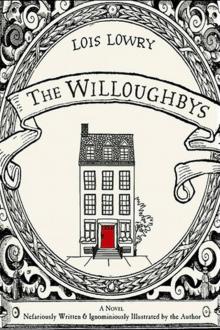 The Willoughbys
The Willoughbys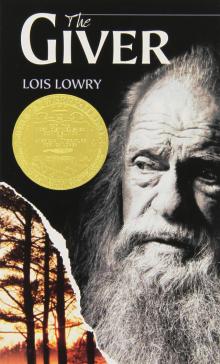 The Giver
The Giver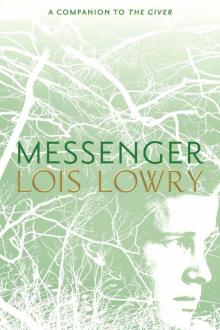 Messenger
Messenger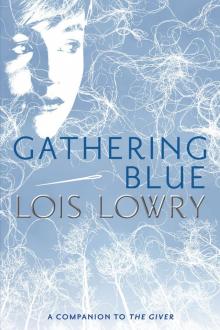 Gathering Blue
Gathering Blue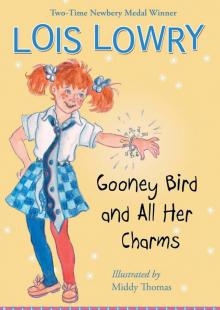 Gooney Bird and All Her Charms
Gooney Bird and All Her Charms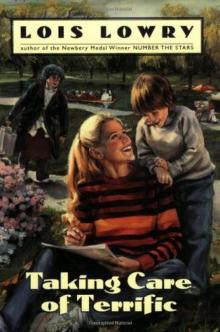 Taking Care of Terrific
Taking Care of Terrific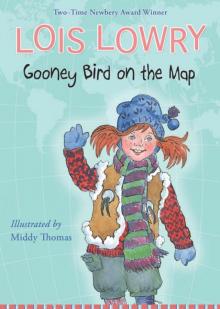 Gooney Bird on the Map
Gooney Bird on the Map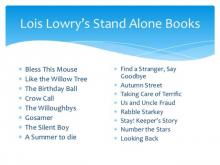 The Birthday Ball
The Birthday Ball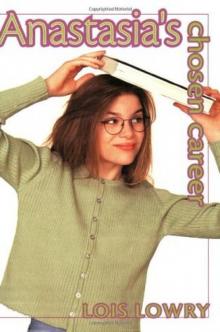 Anastasia's Chosen Career
Anastasia's Chosen Career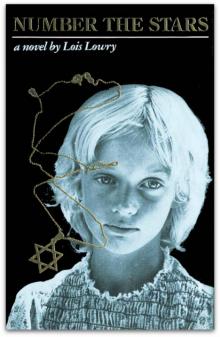 Number the Stars
Number the Stars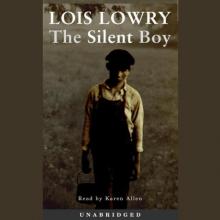 The Silent Boy
The Silent Boy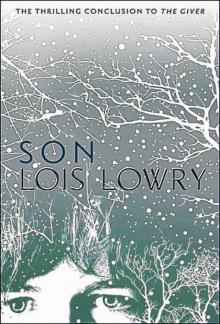 Son
Son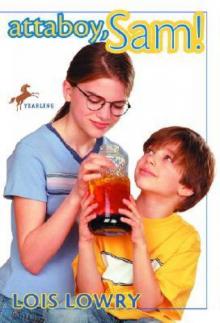 Attaboy, Sam!
Attaboy, Sam!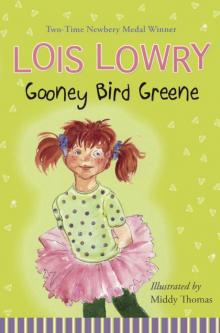 Gooney Bird Greene
Gooney Bird Greene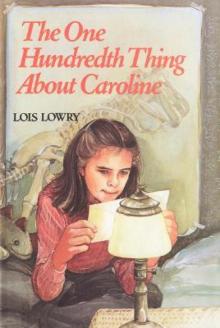 The One Hundredth Thing About Caroline
The One Hundredth Thing About Caroline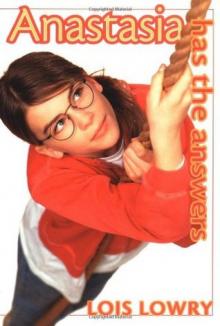 Anastasia Has the Answers
Anastasia Has the Answers Your Move, J. P.!
Your Move, J. P.!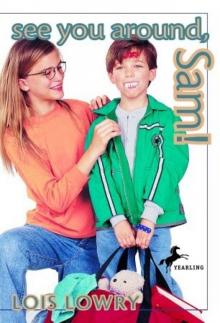 See You Around, Sam!
See You Around, Sam!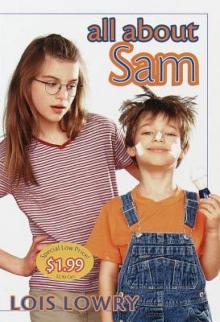 All About Sam
All About Sam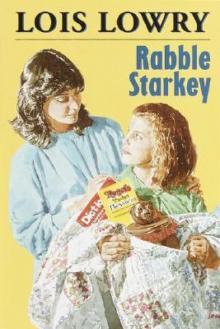 Rabble Starkey
Rabble Starkey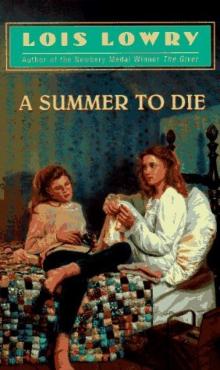 A Summer to Die
A Summer to Die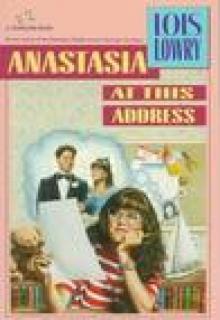 Anastasia at This Address
Anastasia at This Address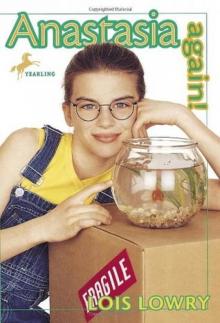 Anastasia Again!
Anastasia Again!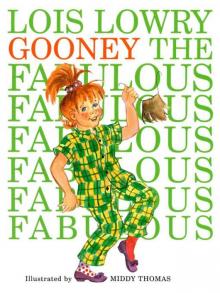 Gooney the Fabulous
Gooney the Fabulous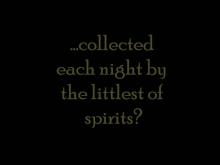 Gossamer
Gossamer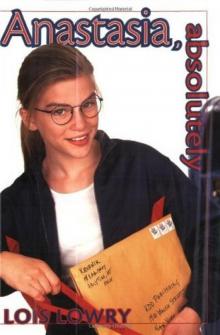 Anastasia, Absolutely
Anastasia, Absolutely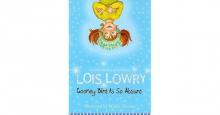 Gooney Bird Is So Absurd
Gooney Bird Is So Absurd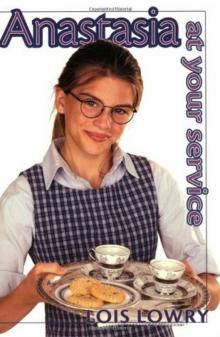 Anastasia at Your Service
Anastasia at Your Service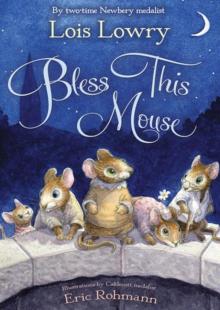 Bless this Mouse
Bless this Mouse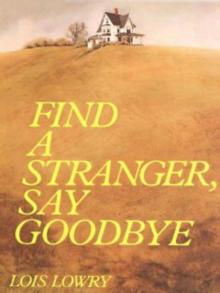 Find a Stranger, Say Goodbye
Find a Stranger, Say Goodbye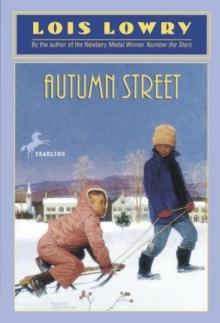 Autumn Street
Autumn Street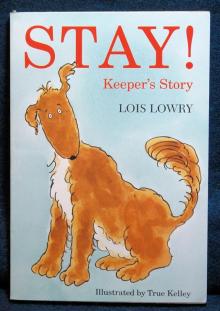 Stay Keepers Story
Stay Keepers Story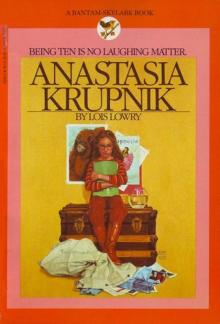 Anastasia Krupnik
Anastasia Krupnik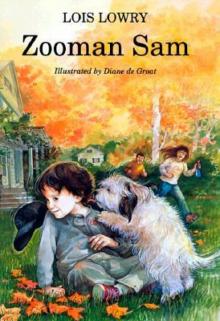 Zooman Sam
Zooman Sam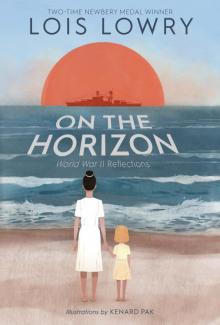 On the Horizon
On the Horizon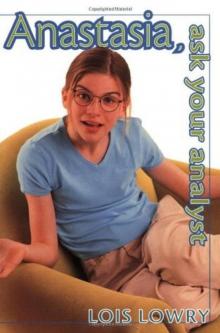 Anastasia, Ask Your Analyst
Anastasia, Ask Your Analyst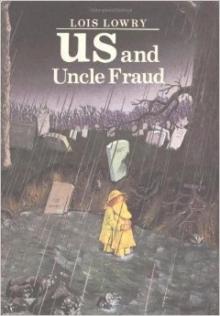 Us and Uncle Fraud
Us and Uncle Fraud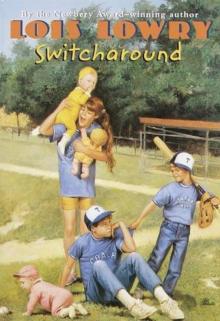 Switcharound
Switcharound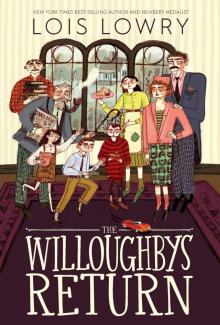 The Willoughbys Return
The Willoughbys Return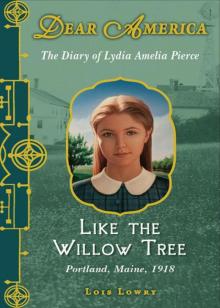 Dear America: Like the Willow Tree
Dear America: Like the Willow Tree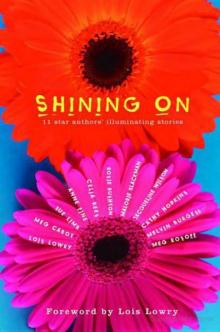 Shining On
Shining On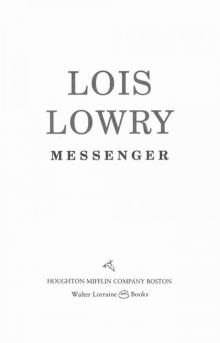 Messenger (The Giver Trilogy)
Messenger (The Giver Trilogy)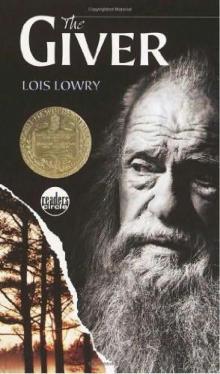 Giver Trilogy 01 - The Giver
Giver Trilogy 01 - The Giver